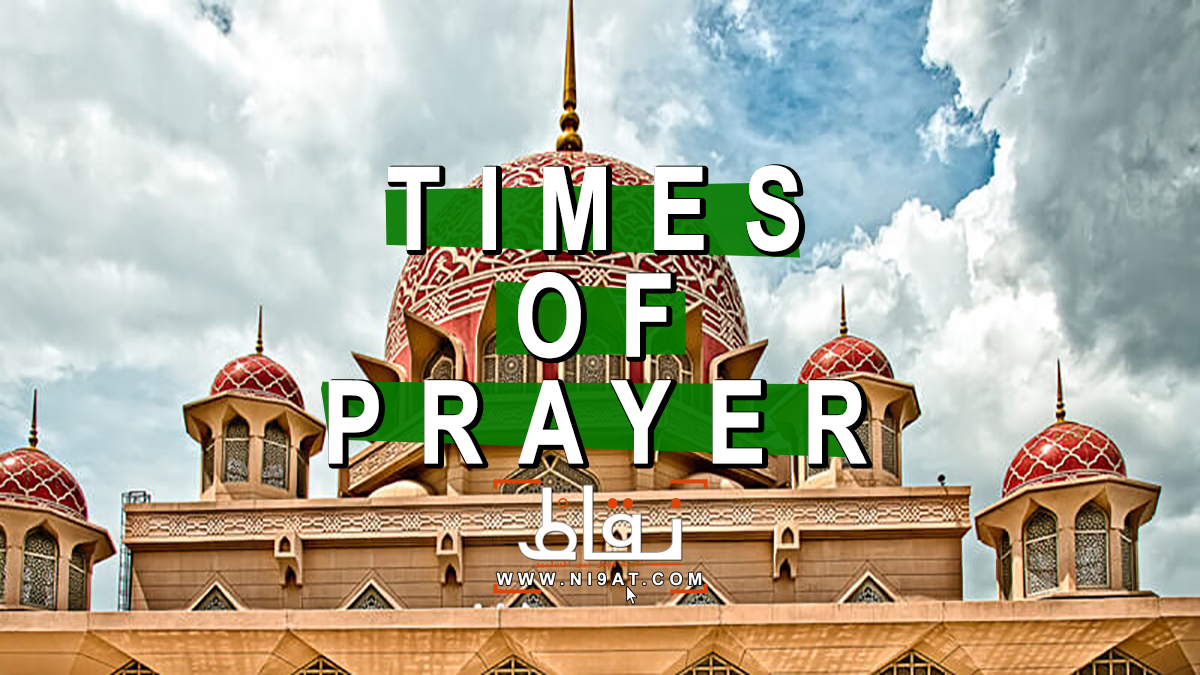Allah, ta^ala said:
إِنَّ الصَّلاَةَ كَانَتْ عَلَى الْمُؤْمِنِينَ كِتَابًا مَّوْقُوتًا
Innas–salata kanat ^alal-mu’minina kitabam mawquta.
Ayah 103 of Suratun-Nisa’ means: {Certianly, the [obligatory] prayers have been prescribed to the believers to be performed at specific times.}
After the belief in Allah and His Messenger, the prayer is the best deed. Allah made five (5) prayers obligatory upon every pubescent, sane Muslim within the night and day. One has to be keen to perform them. Also, one must learn how the time of each prayer begins and how it ends.
The five prayers and their times are:
1- The Noon Prayer (Dhuhr): Its time begins when the sun declines westward from the middle of the sky. It ends when the shadow of an object becomes equal to the length of that object plus the length of its shadow when the sun was at its zenith (dhilul-istiwa‘ ). The object may be a straight wooden stick that is plunged upright into the ground. If the sun moves westward from its zenith, the person will notice that the shadow will elongate and lean eastward. This is the sign that the Noon Prayer is in.
2- The Afternoon Prayer (^Asr): Its time begins after the time of Dhuhr ends, and it ends with the setting of the sun. Hence, if the shadow of an object becomes equal to the length of that object plus its length when the sun was at its zenith, then the time of Dhuhr ends and the ^Asr time begins.
3- The Sunset Prayer (Maghrib): Its time begins with sunset, i.e., the disappearance of the entire disk of sun. It finishes when the redness (evening twilight) in the western horizon disappears.
4- The Nightfall Prayer (^Isha’ ): Its time begins with the disappearance of the redness in the western horizon and remains until the appearance of the true dawn.
5- The Dawn Prayer (Fajr): Its time begins with the appearance of the true dawn, which is a white horizontal light that appears in the eastern horizon. Its time remains until sunrise.
Every pubescent, sane and pure Muslim is obligated to perform these prayers in their times. A woman is pure (tahir) when she is clear of menstruation and post-partum bleeding. It is unlawful, without an Islamic excuse, to perform these prayers ahead of their times or to delay them until their times have passed. Extreme sickness or traveling (with certain conditions) constitute examples of excuse for advancing or delaying the prayers.
Questions:
1. State an ayah that indicates the obligation of performing the prayers.
2. What is the best of deeds after the belief in Allah and His Messenger?
3. How many prayers did Allah obligate the Muslims to perform?
4. How does the time of Dhuhr begin? How does it end?
5. What is Dhilul-istiwa‘ ?
6. How does the time of ^Asr begin? How does it end?
7. How does the time of Maghrib begin? How does it end?
8. What is the evening twilight?
9. How does the time of ^Isha’ begin? How does it end?
10. How does the time of Fajr begin? How does it end?
11. What is the true dawn?
12. Upon whom are these five (5) prayers obligatory? What is meant by pure (tahir)?
13. Give an example of when it is permissible to pray the five (5) prayers ahead of their times or to delay them until their time has passed.

